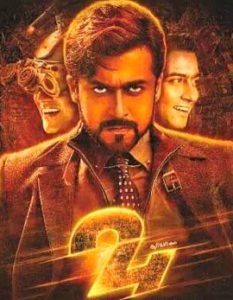 Review: Limited Run
Review: Limited Run
24 | Vikram Kumar | India | 2016 | 164 minutes
Now playing at AMC Fitchburg 18 and Marcus Point Cinemas
James Kreul looks at the most recent popular Indian film to open “wide” (two screens!) in Madison, Vikram Kumar’s 24. Despite flamboyant performances from Suriya (in a triple-role) and audacious time-travel enabled moments, director Kumar (Manam) seems content with lackluster action, romance, and music.
Update 5/13/16: 24 has continued for a second week at AMC 18 Fitchburg, but not at Marcus Point Cinemas.
I’ve been negligent in my coverage of Indian popular cinema in Madison lately. I even missed Fan, the latest release from Bollywood megastar Shah Rukh Khan, when it opened in town the week of the Wisconsin Film Festival. But Indian cinema, in its Hindi, Telugu, and Tamil language iterations, continues to be the most consistently programmed foreign language films available in Madison’s commercial theaters.
This has always made sense at AMC Theaters, due to their Chinese ownership and synergistic relationship with the Asian market. A wider range of Indian and Asian cinema can be seen at AMC’s Mayfair Theater in Wauwatosa. But good old midwestern folks at Marcus Entertainment continue to enter the fray, and now we’re starting to see Indian films open on their global release date on two screens in Madison.
Marcus is slightly less sophisticated in their marketing for the films, putting everything under the banner of Bollywood (see their Bollywood Showcase page, for example), even though properly speaking “Bollywood” refers to the Hindi-language industry (Shah Rukh Khan is one of that industry’s biggest stars). The Telugu (“Tollywood”) and Tamil (“Kollywood”) industries have their own distinct stars and directors, even though some filmmakers, stars, and musicians (like music director A.R. Rahman) work across all three industries. Some people object to all of these nicknames, because they imply that the films are just derivative of Hollywood cinema.
Interestingly, despite the fact that the Hindi industry films are more widely distributed and discussed globally, lately a higher percentage of Telugu and Tamil films have been coming to Madison.
Generally I’m more familiar with Hindi-language filmmakers and stars, but I’m slowly getting familiar with Telugu and Tamil films. Director Vikram Kumar has made films in all three languages. His last film, Manam, which featured three generations of the Telugu-language acting family led by Akkineni Nageswara Rao, was one of my favorite films of 2014.
Kumar’s latest film, 24, teams him up with a major Tamil-language star, Suriya, in what is advertised as a foray into science fiction, but in fact is a relatively conventional combination of action, romance, and music.
 Popular cinema, regardless of its country of origin, often depends on star power and charisma to distinguish films that are otherwise relatively formulaic. 24 is no exception. Much of its appeal depends on the screen presence and charm of Suriya, who appears in three pivotal roles in the film. Indian films often need a handsome leading man and a maniacal villain to succeed with audiences. In 24, Suriya provides both with abundant energy, but that might not be enough to satisfy all viewers.
Popular cinema, regardless of its country of origin, often depends on star power and charisma to distinguish films that are otherwise relatively formulaic. 24 is no exception. Much of its appeal depends on the screen presence and charm of Suriya, who appears in three pivotal roles in the film. Indian films often need a handsome leading man and a maniacal villain to succeed with audiences. In 24, Suriya provides both with abundant energy, but that might not be enough to satisfy all viewers.
In 1990, scientist Sethuraman (Suriya #1) works long, hard hours in his steampunk-inspired laboratory in an elaborate rural bungalow. His wife Priya (Nithya Menen) warns him to stop his current experiment and to think about the safety and future of their infant son, Manikandan. Despite these pleas, he invents a watch capable of manipulating time (forward, reverse, pause), thanks to the mysterious intervention of an enigmatic bird. The bird’s recurring intervention is never clearly explained, but a feather falling into a beaker and dissolving in the acid turns out to be the difference between success and failure.
Unfortunately, as with many good guys in Indian popular cinema, Sethuraman has an evil twin. Athreya (Suriya #2) arrives at the laboratory with his henchmen just as Sethuraman declares his success. Athreya brutally kills Priya, but Sethuraman manages to escape with Manikandan, leading to an obligatory chase sequence .
Sethuraman manages to secure Manikandan’s safety by leaving him—and the watch—with a stranger on a train, Sathyabama (Saranya Ponvannan). Athreya kills Sethruaman, but only succeeds in securing the key to the watch’s container. He jumps from the train to escape what he believes to be a bomb set by Sethuraman, and the fall leaves him paralyzed from the waist down and in a coma.
The watch remains with Sathyabama and young Manikandan. The key remains in Athreya’s clutched hand for the duration of his coma, which lasts 26 years.
When Athreya wakes up in 2016, his rage about his condition provides even more motivation to find the watch. No one noticed, however, when the key dropped out of his hand as he emerged from the coma. Through a series of coincidences, the key ends up in the possession of grown-up Manikandan—now nicknamed Mani (Suriya #3)—who of course has become a watch repairman. Mani quickly discovers the watch’s time-shifting powers.
Mani uses these powers during a meet-cute with a beautiful customer, Sathya (Samantha), who has brought in her grandfather’s watch for repair. Sathya’s name is short for Sathyabama, the same name as Mani’s adoptive mother, and of course we will soon discover more direct connections between the two women.
 24 is fun, but not distinguished. As readers will know from my previous Indian cinema reviews, I try to account for a balance of action, romance, and music in these films. The action is relatively pedestrian, but I do have to acknowledge a particularly audacious cliffhanger at the interval, one that is surprisingly violent (and disturbed a young child sitting behind me) and shocking until you remember that time-travel can quickly reverse its consequences.
24 is fun, but not distinguished. As readers will know from my previous Indian cinema reviews, I try to account for a balance of action, romance, and music in these films. The action is relatively pedestrian, but I do have to acknowledge a particularly audacious cliffhanger at the interval, one that is surprisingly violent (and disturbed a young child sitting behind me) and shocking until you remember that time-travel can quickly reverse its consequences.
Suriya really chews up the scenery as the villain Athreya, which is fun even as he becomes more grating. The audio seems to intentionally peak and distort during Athreya’s louder lines, which has a visceral effect on the viewer.
Despite the charisma of Suriya and Samantha, the romance between Mani and Sathya disappoints, particularly because Sathya is often portrayed as gullible and dim-witted. Mani has a few repeated catchphrases used to gaslight Sathya into thinking that she sees him everywhere due to a disease brought about by intense true love. While running gags and repeated catchphrases are common tropes, here they make you feel like you’re trapped in a Bad Samuel Beckett contest.
The music sequences also underwhelm, despite the participation of music director A.R. Rahman. Music sequences never have to be fully integrated into the narratives of these films, but there’s something peculiarly abstract running through the music sequences here. Jump cuts and CGI make things literally abstract during “Kalam Yen Kadhali,” which in my opinion sucked the life out of the sequence instead of adding kinetic energy. While it is conventional in these films to have music sequences shot in scenic European locations, here the material shot in Poland seems distractingly different from the tone of the rest of the film.
Plot-holes abound, which is common for time-travel scenarios, but several choices in the climactic sequence followed delightfully skewed logic that pleasingly undercut our expectations for young Mani’s role in the action.
I’ll give director Kumar a pass on this one, because the use of time and multiple-generations in Manam was inspired enough to make up for the deficiencies here. I also look forward to seeing more from Suriya, who demonstrates his star power and charisma in each of his roles.
Now that some Indian films can open on two screens in Madison, hopefully we will get a wider range of films, like those featured as near as Wauwatosa, on our screens as well.